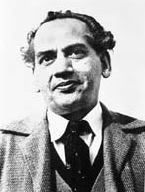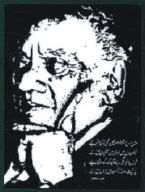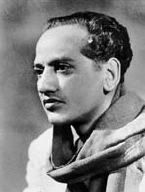Adil Najam
Today is the 25th death anniversary of Faiz Ahmed Faiz. Maybe we can remember him by sharing the verses from him that are most moving for us.
Pakistaniat readers are well aware of the aqeedat ATP has for Faiz Ahmed Faiz. Indeed, in some ways ATP started with a tribute to him and to the everlasting power of his words.
I think when we started this site my sentiment was “aaj baazar meiN pabajolaaN challo.” Today, more than three years later I find myself still engrossed in the same poem; but, maybe a little further into it, sometimes feeling like “phir humm he qatl ho ayeeN yaaro, challo.”
But that may just be the mood of the moment. What, in Faiz, are you thinking of dear readers. Share your favorite Faiz verse with us, please, and tell us what moves you about it.
Meanwhile, to get you rolling, let me repost from an earlier post I had done back in 2007 to mark Faiz Sahib’s birthday. In it I had highlighted a few of his works (including in his own voice) that were my particular favorites. Maybe, these will spur you into identifying yours:
It is always amazing that no matter what the issue, Faiz always has something to say that is not only relevant but revalationary (often it is also revolutionary).
Something that helps us express what we really feel but are unable to articulate. Something that helps us explain what we could not understand. Something that forces us to confront what we would much rather ignore. Something that rises above our fears and speaks to our hopes.
What, then, can one say about Faiz and Pakistaniat that Faiz Sahib has not said himself:
Nisar mein teri galiyoun pay aye watan kay jahaN
Chali hai rasm kay koee na sar uTha kay chalay
Jo koee chahnay waala tawaaf ko niklay
Nazar jhuka kay chalay, jism o jaaN bacha kay chalay
As always, I can offer no better tribute to Faiz Sahib than his very own words. So, here is my very own Faiz Mela for you. A selection of poetry from Faiz that has and continues to inspire me. Poetry that assumes new meaning every time I hear it. Poetry that speaks directly to the state of my existence, to the nuances of my aspirations, and to the core of my convictions.
First, these three poems, presented here in Faiz’s own voice, each of which is as much a credo for this blog as hum daikhain gay:
Nisar mein teri galiyoun pay…
[audio:http://lcweb2.loc.gov/mbrs/master/salrp/082 06.mp3]
Aaj baazar mein pa-bajoulaN chalo…
[audio:http://lcweb2.loc.gov/mbrs/master/salrp/082 14.mp3]
Bol…
[audio:http://lcweb2.loc.gov/mbrs/master/salrp/082 05.mp3]
A fourth poem that I would have added to this list is Intisaab. It has been most beautifully sung by Nayarra Noor, and I recently stumbled on this wonderful video based on part of that poem (I wish it had used the entire poem):
Along with Nayarra Noor, Tina Sani is someone who sings Faiz with a heartfelt passion and understanding; both, of course, are at their best when singing Faiz nazms composed by Arshad Mahmood. There are many Tina Sani renditions that are worth celebrating, but here is a relatively new one – on the poem mairay dil mairay musafir – which like everything above seems to speak personally to me (and to so many others). For those of us who are living in diyar-i-ghair, this is a particularly pertinent poem which is sung particularly well:
Of course, no Faiz Mela can conclude without Iqbal Bano singing Hum Daikhain Gay. Long-time readers of this blog know that ATP and its notion of Pakistaniat (also here) is inspired by Faiz and by this particular tarana of Pakistaniat. Our very first post was based on my own amatuerish effort to visualize that vision, and probably no one except Jinnah has been quoted more often at ATP than Faiz Ahmad Faiz. I have posted it a number of times since then. Let me please do so again. This time, not as much for my visualization as for Iqbal Bano’s wonderful rendition.
Yes, Lazim Hai Kay Hum Bhi Daikhain Gay:























































Faiz on Pakistan :
Tujh ko kitnon ka lahu chahie ae arz-e-watan
Jo tere arz-e-berang ko gulnaar karein
Kitni aahon se kaleja tera thhanda hoga
Kitney ansoo tere sehraon ko gulzar karein
————————————————————————–
The blood of how many do you need O motherland;
That which will brighten your colourless earth;
How many sighs will soothe your heart;
How many tears will cause your deserts to bloom.
the first time i read faiz i was stuck with him and his poetry for 2 years and kept away from writing anything of my own..
he is an inspiration, a teacher , a revolution in my life and someone i revere from my heart
i lov this couplet from him
Hum khasta tanon se mohtasebo kia maal manaal ka poochtay ho
Jo umr se hum nay bhar paya wo samnay laaye detay hain
Daman main hay musht e khaak e jigar, saaghar main khoon e hasrat e mae’
Lo hum ne daaman jhar dia, lo jaam ultaaey detay hain…
What a coincidence! I had Faiz’s Nuskha’hai Wafa in my hand and was reading it, as I accessed ATP and came across this post. This is what I was reading:
” Aur kuch dere na guzray shab e furqat say kaho
Dil bhi kum dukhta hai, woh yaad bhi kum aatay hain.
For brother “Hasan” from Bangladesh–please note Faiz Sahib did go to Bangladesh for reconciliation and wrote this great lyric:
” Hum kay thehray ajnabi kitni madaraton kay baad
phir banain gey aashna hum kitni mulaqaaton kay baad
Kub Nazar mein ayegi beydaag subzay ki bahaar
Khoon kay dhabbay dhulaein gey kitni barsaaton kay baad”
Here he has drawn pen picture of Bengal
and great power of expression regarding his feelings.
Please refer to comment of brother “Adil Mulki ” in this thread for details.
I remember Faiz Sahib’s famous “Abb bhee dil kash hey taira husn magar kia key gayy-aa” due to a reason.
It so happened that as freshly minted medical graduate I joined house job in surgery and one of my first patients was a young, newly married girl who sustained severe burns on significant portion of her body due to “kerosine oil cooker blast”. Once in her disinhibited state of mind under anesthesia she asked my fellow surgeon “doctor kia mein abb bhee khobsoorat hoon?”. I could not answer her question but this ghazal of Faiz sahib came to me (nazool hua)instantly.
To cut long story short surgery was never my cup of tea so I joined Psychiatry and remained with it, ever since.